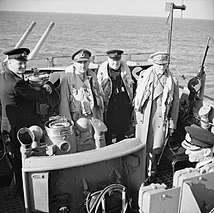Edward Parry (Royal Navy officer)
| Sir Edward Parry | |
|---|---|
 Prime Minister Winston Churchill on 12 June 1944, on board a destroyer going to France, with Field Marshal Jan Smuts, Field Marshal Sir Alan Brooke and Rear Admiral W E Parry (bottom right). | |
| Born | 8 April 1893 |
| Died | 21 August 1972 (aged 79) |
| Allegiance | United Kingdom |
| Service/ | Royal Navy |
| Years of service | 1905–1951 |
| Rank | Admiral |
| Commands held |
New Zealand Division HMS Renown Indian Navy |
| Battles/wars | |
| Awards |
Knight Commander of the Order of the Bath Commander of the Legion of Merit (United States) Officer of the Legion of Honour (France) |
Admiral Sir William Edward Parry, KCB (8 April 1893 – 21 August 1972) was an officer of the Royal Navy.
Naval career
Parry joined the Royal Navy 1905 and served in the First World War.[1] He was appointed Officer in charge of the Anti-Submarine Establishment at Portland in 1936.[1] During the Second World War, he served as Commander-in-Chief of the New Zealand Division commanding HMNZS Achilles at the Battle of the River Plate in December 1939.[1] He assumed command of HMS Renown in 1943.[1] He took part in the Normandy landings and served on the staff of Allied Naval Commander-in-Chief of the Expeditionary Force in 1944.[1] After the war he became Deputy Head of the Naval Division at the Allied Control Commission in Germany.[1] Parry became Director of Naval Intelligence in July 1946 and Chief of Naval Staff (Commander-in-Chief) of the Royal Indian Navy in August 1948.[1] He was advanced to Knight Commander of the Order of the Bath in the 1950 New Year Honours[2] before retiring in 1951.[1]
In the 1956 film The Battle of the River Plate, Parry was played by Jack Gwillim.
References
- 1 2 3 4 5 6 7 8 Liddell Hart Centre for Military Archives
- ↑ "No. 38799". The London Gazette (Supplement). 30 December 1949. p. 39.
External links
| Military offices | ||
|---|---|---|
| Preceded by Henry Horan |
Commander-in-Chief, New Zealand Division 1940–1941 |
Post discontinued |
| Preceded by Edmund Rushbrooke |
Director of Naval Intelligence 1946–1948 |
Succeeded by Eric Longley-Cook |